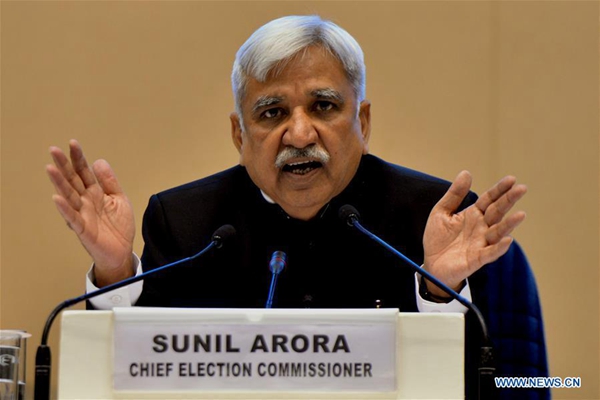What's really at stake in the world's most expensive elections
- By Niranjan Sahoo
 0 Comment(s)
0 Comment(s) Print
Print E-mail China.org.cn, March 23, 2019
E-mail China.org.cn, March 23, 2019

On March 10, India's Election Commission announced the dates for its 17th general elections. The seven-phase polls commencing on April 11 is an astounding exercise of franchise anywhere in the world. With nearly 900 million eligible voters (more than the combined population of Europe and Canada) exercising their ballots to elect a new government, managing and running India's general election is billed as one of the most challenging jobs in the world.
The sheer size of logistics required to conduct an election of such magnitude is simply mind numbing. More than 1 million polling stations, some 2.33 million ballot units (electronic voting machines) and 1.63 million control units (the ballot machines can be used only after the presiding officers of the polling stations press the control button.) are needed to conduct the entire exercise which lasts for over a month.
In addition, a mammoth 11 million polling staff including security forces will be required to conduct this mega exercise. The electoral commission also estimates that it will need 120 trains, 200,000 buses and cars as well as other forms of transport including elephants, camels and horses to carry ballot boxes to India's remote regions. It is no wonder that an electoral exercise of such magnitude requires a huge amount of money.
Democracy costs money
The upcoming general elections is being dubbed the most expensive exercise in the world, surpassing even the record amount spent during the 2017 U.S. Presidential Polls. The election commission and political parties are expected to spend anywhere between US$7-8 billion for the entire electoral process. While this is a conservative estimate, political parties and candidates are likely to spend many times more to stay in the cutthroat electoral race. Candidates and parties also have to spend a lot of resources on logistics, communications, hiring workers, road shows and other campaign materials. A lot of money will also go in social media spending to attract younger and more tech savvy voters who have accounts on multiple platforms including Twitter, Facebook, WhatsApp and others. While the expensive nature of the elections could erode public faith in the democratic process, political parties have little choice. Election victory is the only road to power in a democracy.
Issues in the elections
The 2019 general elections is being held under the shadow of serious rural distress marked by low wages and poor returns from farm investments. This is clearly seen in the growing unrest by farmers throughout the country who have demanded better prices for their produce, less income fluctuations and better support from the state. The other major issue that would significantly shape the outcome of the general elections is growing unemployment. A series of recent reports have highlighted the growing job crisis in much of rural India and smaller towns. All the political parties, particularly the government in power, fear a backlash by disenchanted young voters who now grossly outnumber older voters. Yet, the most surprising issue that has taken center-stage in the election campaign is the one of national security involving the clash with Pakistan during the recent Pulwama attack.
Modi vs. the rest
Issues notwithstanding, the 2019 general elections is seen as a referendum on Prime Minister Narendra Modi's eventful five-year tenure. While this is a parliamentary election, given Modi's strong personality and leadership style, such polls, including the last one, are increasingly becoming a referendum on the Modi's party, the ruling Bharatiya Janata Party (BJP) is now facing stiff competition from the united opposition led by the National Congress, the oldest party which has held power for most of India's post-independence years. Fearing their political existence (as the BJP has won most of the provincial elections in the last five years), the united opposition is not sparing any efforts to corner the Modi government.
Despite its many achievements, the ruling party and its political allies are expecting to win again on Prime Minister Modi's charisma and almost magical charm that swept him to power in the last election. While Modi's popularity has taken a drubbing after five years in office, the master tactician might throw up yet another surprise for his party. Yet, those who know Indian voters also realize that the electorate too is more than capable of pulling last-minute surprises. This is what still makes the 2019 poll anybody's game, as no party can take anything for granted.
Niranjan Sahoo is a columnist with China.org.cn. For more information please visit:
http://m.keyanhelp.cn/opinion/NiranjanSahoo.htm
Opinion articles reflect the views of their authors only, not necessarily those of China.org.cn.
If you would like to contribute and have specific expertise, please contact us at opinion@china.org.cn.





